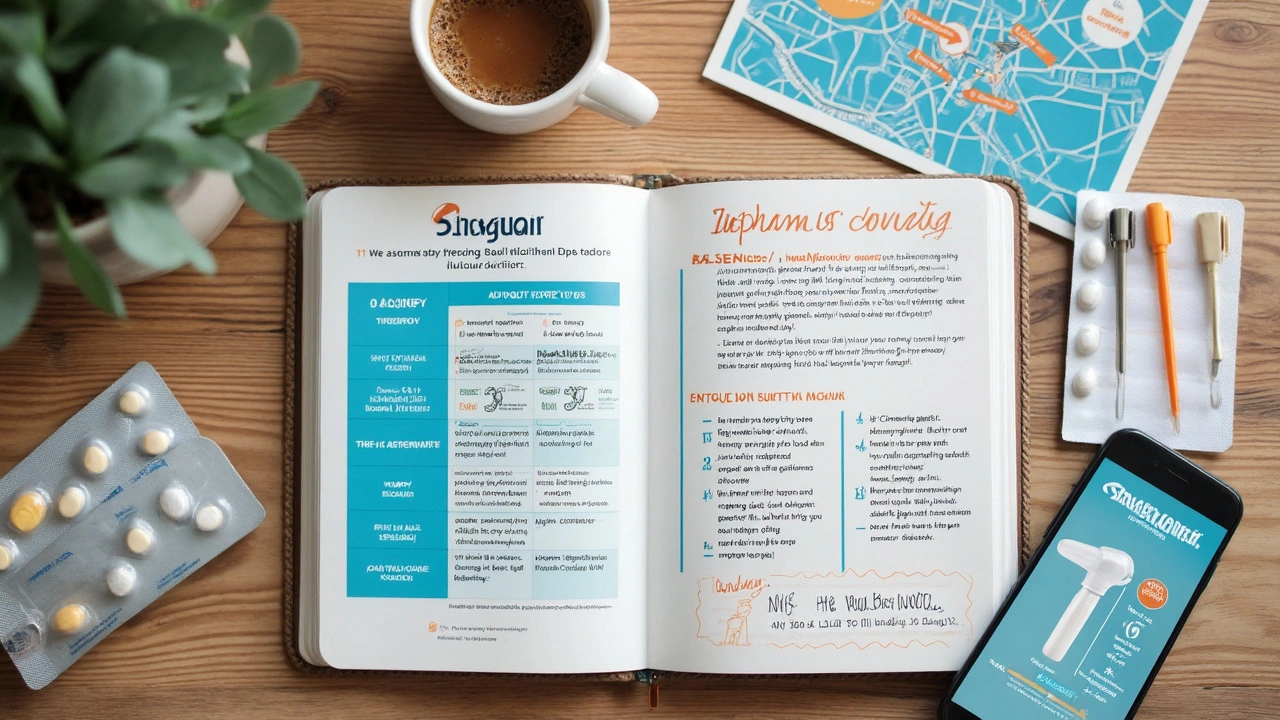
Picture yourself gasping for breath in the middle of the night, or sneezing so much at your kid’s soccer game that you miss their only goal. For a lot of folks with asthma or relentless allergies, that’s just a Thursday. And that’s exactly why singulair—known by its less catchy name, montelukast—pops up so much in conversations at doctor’s offices and online forums. But this little scored pill stirs up debate, curiosity, and plenty of questions: What exactly does this drug do? Does it work differently than an inhaler or allergy shot? And should you worry about those warnings you saw in the news?
What's Behind Singulair: How Montelukast Keeps Airways Open
Singulair doesn’t act like your typical rescue inhaler or a heavy-duty steroid spray. Instead, it targets a specific pathway in your body’s allergic and asthma response—the so-called leukotriene pathway. Leukotrienes are tiny chemicals your immune system pumps out when it thinks you’re under attack, whether from pollen or a cold virus or even cold air. These chemicals tighten airways, create swelling, and bring on the wheezing, coughing, or relentless nose running that makes life miserable.
Montelukast, the main ingredient in Singulair, blocks receptors for leukotrienes. Imagine someone changing the locks in your door; now the troublemakers can’t get inside. The brilliant part? It works before symptoms explode, so it’s all about prevention. That’s why doctors prescribe it to people who can’t get their asthma or seasonal allergies under control with other meds, or who react badly to standard treatments.
What’s wild is just how many people take montelukast. In 2023 alone, US pharmacies filled more than 16 million prescriptions for generic montelukast, according to IQVIA data. Kids often get it as a flavored chewable. Grownups might take the pill before bedtime. It’s FDA-approved for ages as young as 12 months for asthma and as young as 2 years for certain allergies. Is it a miracle drug? Well, not quite—but for some, it’s the missing piece in their asthma or allergy toolkit.
Who Should Use Singulair? And When Is It Not the Answer?
Here’s where it gets a little tricky: Singulair isn’t for every cough or sniffle. If you only get stuffy in May or can squash an asthma flare with an inhaler and a nap, your doc probably won’t reach for montelukast first. But for those with persistent asthma—meaning symptoms more than twice a week, or nighttime coughing that destroys sleep—Singulair can be a real asset. It’s also common for people who can’t tolerate inhaled steroids (maybe they get nosebleeds or candida from those drugs) or for folks with allergic rhinitis that just doesn’t quit.
Lots of families like it because it’s a pill (or a chewable, or even tiny granules for toddlers), so there’s no fussing with inhalers. Still, doctors almost never pick it as the only medication for severe or sudden asthma attacks—it just doesn’t act fast enough. The National Asthma Education and Prevention Program still ranks inhaled steroids as the backbone for managing chronic asthma. Think of Singulair as the trusted backup singer, not the lead act.
Some people even use it before exercise if they’re prone to cold-weather induced asthma. That’s because it helps reduce those leukotriene-triggered airway spasms. In a 2021 study in the American Journal of Respiratory and Critical Care Medicine, kids who took montelukast before sports had fewer asthma flare-ups and less need for their emergency inhaler. Of course, every person’s plan is a little different. Some do best combining Singulair with allergy shots or regular antihistamines.
But—and here’s a big but—Singulair does not treat acute asthma attacks. If you or your child is struggling to breathe, reach for the rescue inhaler, not a Singulair tablet. Some doctors are now more cautious about starting montelukast in young kids unless absolutely necessary, given safety concerns that have surfaced in the past few years.

Possible Side Effects and Why FDA Added a Black Box Warning
If you’ve heard of Singulair, you might also have heard the words "black box warning". It isn’t just a scary label—the FDA slapped that most serious side effect warning on montelukast in 2020. The trigger? Reports of neuropsychiatric events in some patients, especially children. That means mood changes, nightmares, sleepwalking, aggressive behavior, depression, and even suicidal thoughts. This doesn’t happen to most folks, but it’s important to know.
The table below highlights some potential side effects and how often they show up based on published clinical trial data:
| Side Effect | Estimated Occurrence in Trials |
|---|---|
| Headache | 18% |
| Cough | 11% |
| Abdominal pain | 2–4% |
| Neuropsychiatric (sleep, mood, behavior) | Less than 1% (may be underreported) |
| Elevated liver enzymes | Less than 2% |
Now, most people skate by with few or no side effects. Some feel a bit of a headache or get a mild tummy ache. For others, though, behavioral changes can feel like someone swapped out their kid for a stranger. If that’s you, don’t tough it out—let your healthcare provider know, because there are alternatives. Studies suggest these mood effects go away quickly once the drug is stopped.
The FDA recommends that patients and parents weigh the benefits and risks. If Singulair helps you skip trips to the ER or keeps you playing outside all spring, there’s a lot to gain. But if you or your child starts acting out of character, don’t brush it off. Tips for safer use: Never give more than the prescribed dose. Tell your doctor if there’s a history of depression, anxiety, or psychiatric illnesses in the family. And track symptoms in a notepad or app, so you catch any changes early.
Singulair vs. Other Medications: How Does It Stack Up?
People always want to know how Singulair compares with other asthma or allergy meds. Here’s the TL;DR: it isn’t usually as potent as a steroid inhaler for daily asthma control, but it can boost results when added to them. For allergic rhinitis (the snotty, sneezy part of allergies), it works about as well as common antihistamines like loratadine, but not really better. Plus, you only take it once a day, which is handy for busy families or forgetful teenagers.
If you need quick relief within minutes of symptoms hitting, reach for your rescue inhaler or a fast-acting antihistamine. Montelukast isn’t built for that. For ongoing inflammation that’s always lurking in the background—like that tightness in your chest in the early morning or itchy eyes through April and May—it does best.
Here are some practical scenarios where it shines:
- Kids who have trouble mastering inhaler technique (raise your hand if you’ve watched your 7-year-old spray their face instead of their mouth).
- Patients who can’t or won’t use nasal sprays (either from side effects or stubbornness).
- People who want to avoid steroids, even low-dose ones.
- Travelers needing something simple and portable.
- Folks with both asthma and seasonal allergies, so they don’t have to juggle multiple prescriptions.
One tip: Take your singulair dose at the same time each day, ideally in the evening. This makes it easier to remember, and many studies suggest it works better this way for nighttime asthma symptoms.
A few things to look out for: If you’re already on another medication for anxiety, mood, or seizures, talk to your doctor about interactions with Singulair. And even though food doesn’t affect how your body absorbs it, some people find it easier on the stomach if taken with a snack.
If other options haven’t worked, or you need something extra that won’t complicate your routine, Singulair might fit your life. Just go in with your eyes open, pay attention to any changes in mood, and check in with your provider if anything feels off. For thousands of families, montelukast offers a break from constant wheezing or the dreaded ragweed season—it’s not the answer for everyone, but it can be a solid piece of the asthma and allergy puzzle.

Honestly, Singulair has been around for quite some time and it's often seen as a reliable option for asthma and allergy sufferers. But honestly, it’s not a miracle cure either. People often overlook the fact that, like any medication, it has its own baggage of side effects that can be pretty serious in some cases.
For instance, I’ve read about concerns regarding neuropsychiatric effects, which should definitely make you pause and think. If you're relying on it just because it's well-known, maybe take a step back and question if it's really the best for you.
That said, the nature of this drug means you have to weigh the benefits against risks, and that's something only a professional can really help you with. But don't just blindly follow the popular opinion.
Also, comparing it to other meds, it occasionally sits in the middle ground — not the strongest but useful as an add-on or alternative.
So yeah, anyone thinking about starting or continuing Singulair should really do some research and talk thoroughly with their doc. With so many options out there, why settle for less than the best fit for your own body?
This article is quite helpful for people like me who are always looking for simple ways to understand medicines. Montelukast has helped many people manage asthma and allergies without complicated procedures or treatments.
It's important that the article talks about how the drug works because some medications can be confusing. I think the honest talk about side effects is good because patients need to know what to expect and when to call their doctors.
I've seen friends struggle with allergies, and having a guide like this to tell you when to consider Singulair instead of other meds is a big plus. Everyone is different and what works for one person might not for another.
Hopefully, articles like these make people less scared and more informed. We should all encourage more clear and simple information about health stuff.
While I appreciate the effort to inform, I find these articles tend to gloss over essential warnings. The so-called 'honest talk' sometimes reads like it's saving face for big pharma.
Montelukast, under the brand Singulair, has been flagged repeatedly for its potential psychiatric side effects—something that deserves front-page attention, not a brief mention buried deep in the text.
Patients deserve transparency, not shallow reassurances. The dosage instructions, contraindications, and long-term implications should be explicit to avoid careless usage.
In my experience, relying solely on such articles can lull patients into a false sense of security, which is unacceptable.
Call me paranoid, but medical narratives often play down risks to push sales. Always consult multiple sources before accepting the portrayal of any drug's safety.
This post does a good job giving a solid overview of Singulair. It’s tricky when trying to manage asthma or allergies because you want relief but also want to avoid harsh medications.
Montelukast seems like a decent middle ground for some. It’s not a quick fix, but it helps reduce inflammation and symptoms over time.
I always advise anyone dealing with chronic respiratory issues to discuss treatment plans with their healthcare provider. Every case is different, especially with underlying conditions that might complicate the picture.
The comparison to other meds is also useful because it shows Singulair isn’t the only game in town and might not be the perfect fit for everyone.
Hopefully, more folks get access to clear info like this before making medication choices.
Omg, I’ve been taking Singulair for allergies for a while, and honestly, it’s kind of like a love-hate relationship. On the bright side, it definitely helps reduce my sneezing and congestion when pollen season hits hard.
But can we please talk about the side effects? I mean, sometimes the brain fog it causes is brutal. It’s almost like they take some of your focus away just to give you relief from allergies. Kind of a weird trade-off, right?
This article does a nice job breaking things down, but I wish it had definite warnings upfront about the mood changes some people experience.
Also, I didn’t realize that Singulair isn’t a steroid, which I actually prefer. I’m always worried about steroids messing with my body’s natural balance.
Anyway, thanks for putting this together. It’s nice to have info that isn’t just fearmongering but still lets me know the risks.
I find it fascinating how our reliance on medications like Singulair for chronic conditions unveils the complexity of managing human health. Asthma and allergies challenge not just our physical bodies but also our sense of control over well-being.
Montelukast represents a bridge between immediate relief and long-term management, but it also compels us to consider the philosophical nuances of medication dependency.
Are we trading parts of our natural human experience—like risk, discomfort, and adaptation—for convenience and control? Or is this a necessary evolution of modern health care?
This guide prompts reflection on those questions, especially as it balances practical information with the inevitable unpredictability of side effects.
It's a reminder that every medical decision is embedded in deeper existential considerations.
Hey folks, I just wanted to jump in and say this article is a solid start for anyone curious about Singulair. The straightforward info helps cut through the medical jargon that can sometimes block understanding.
For those worried about side effects, remember that monitoring your health closely with your doctor can make a huge difference in catching issues early.
Also, I think it's great the article compares Singulair to other meds because it allows you to see where it fits in treatment options rather than assuming one size fits all.
Allergies and asthma can be pretty frustrating, so having meds that work well individually is key.
Anyone else here tried Singulair? Would love to hear different experiences.
Not to stir the pot, but I feel Singulair might have more secrets than we’re told. There’s been chatter on forums about suppression of reports on its serious side effects.
Pharmaceutical companies often twist data to their benefit, and it’s no surprise if Singulair's safety info is sanitized for mass consumption.
That 'honest talk' mentioned? I call that barely scratching the surface. What about long-term dependency or worsening symptoms after stopping the drug?
Plus, considering it was once widely prescribed, why were some doctors so quick to abandon it later? Makes me think we are only getting one side of the story.
Anyone else skeptical of the mainstream narrative? It’s critical to question more deeply before handing over trust to any medication.
As someone who’s struggled with asthma and allergies for years, I appreciate an article that doesn’t just glorify the meds but shows the full picture. Singulair isn’t perfect but it is vital for many of us.
What really stands out is the practical tips for safer use — that’s gold and often missing in brief online content.
The balance of hopeful and cautionary notes helps people make real choices instead of just following trends.
We all know the frustration of trial and error with these things. Having honest info upfront saves time, energy, and sometimes health.
Articles like this should be shared widely among patients and caregivers alike.
Briefly: Singulair acts on leukotrienes, which cause inflammation and allergic reactions. This mechanism can help reduce asthma symptoms and allergic rhinitis.
However, it’s important to recognize that efficacy varies per individual — some get significant relief, others less so.
Side effects, especially neuropsychiatric ones, while rare, are serious enough not to ignore.
My advice is to not view Singulair as a magic bullet, but a tool in your respiratory health toolbox.
Engaging in open dialogues with your healthcare provider remains key — it’s your health, after all.
Interesting points all around. From my perspective, the psychological side effects linked to Singulair raise bigger questions about how society treats chronic illness and risk.
It’s almost as if any discomfort or side effect is a sign that medication is 'failing', ignoring how complex reactions can be.
This article is good in that it tries to provide clear-cut info but I wonder if we are too eager to find neat solutions for messy human conditions.
Really, the challenge is not only medical but mental and social too, and any guide should consider that multifaceted nature.
Singulair, like any drug, exists in the intersection of biology and experience.